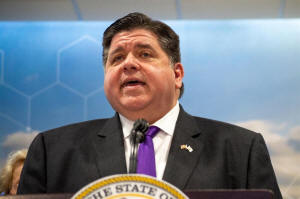Pritzker: Tax cuts on the table if state revenues continue to exceed
expectations
 Send a link to a friend
Send a link to a friend
[March 16, 2023]
By JERRY NOWICKI
Capitol News Illinois
jnowicki@capitolnewsillinois.com
 SPRINGFIELD – With two months to go before the legislature adjourns and
current-year revenues continuing to smash expectations, Gov. JB Pritzker
said he and legislative leaders are considering tax cuts. SPRINGFIELD – With two months to go before the legislature adjourns and
current-year revenues continuing to smash expectations, Gov. JB Pritzker
said he and legislative leaders are considering tax cuts.
His comments came one week after the legislature’s nonpartisan
Commission on Government Forecasting and Accountability, or COGFA,
increased its revenue estimates by about $1 billion for the current and
upcoming budget years combined.
“I would like to see – as we feel comfortable with these new revenues
coming in and their stability; and I think we're seeing a few years in a
row now of the stability of that revenue – that we should be talking
about whether there are tax cuts that we can implement,” he said at an
unrelated news conference at a Springfield community college.
The governor did not say whether tax cuts would be permanent or which
taxes he and lawmakers are considering cutting. And tax cuts were one of
several potential uses of excess revenues the governor said he would
like to consider. Others include contributions to the state’s “rainy
day” fund and added payments beyond required amounts to the state’s
pension system.
The conversation about what to do with excess revenues that show
year-over-year stability is one Pritzker said has involved both
Democrats and Republicans.
House Minority Leader Tony McCombie, R-Savanna, told Capitol News
Illinois in a statement that the House GOP stands ready to work with the
governor.

“To hear the governor mention any tax cuts is an exciting prospect for
families across our state. At the first meeting I had with Gov. Pritzker,
we discussed the cumbersome franchise tax on small businesses and high
estate taxes that unfairly target family farms,” she said. “The governor
recognizing conversations with Democrats and Republicans gives me hope
that we will reinstitute the bipartisan budget working group with our
budgeteers and appropriation teams leading the way.”
McCombie also noted the House Republicans oppose a graduated income tax,
which Pritzker has said he has no interest in reviving as a legislative
proposal this year.
Senate Minority Leader John Curran, R-Downers Grove, referred to
business-related tax incentives that Pritzker and lawmakers approved on
bipartisan lines in 2019 but which Democrats froze in future budget
years.
“Initial discussions on tax relief have been receptive,” Curran said in
a statement. “We will continue to call for implementing the business
incentives that the governor agreed to in the Blue Collar Jobs Act,
along with additional tax relief for Illinois families and small
businesses.”
He said the Senate GOP is hopeful Pritzker will “include Republicans at
the table of substantive budget meetings,” and they are “willing to
negotiate in good faith."
In their budget approved last summer for the current fiscal year,
lawmakers included an array of mostly temporary tax relief. That
included direct checks of $50 or more to most Illinoisans depending on
income and number of children, a permanent expansion of the state’s
earned income tax credit to 20 percent of the federal credit, a
six-month pause on a 2-cent gas tax increase that ended Jan. 1, a
one-year suspension of the state’s 1 percent grocery tax that ends June
30, and a property tax rebate up to $300 for some Illinoisans.

[to top of second column]
|

Gov. JB Pritzker is pictured at a news
conference at Lincoln Land Community College in Springfield where he
discussed the higher education investments in his Fiscal Year 2024
budget. At the news conference he said he and legislative leaders
have discussed potential tax cuts in the upcoming fiscal year if
state revenues continue to exceed expectations. (Capitol News
Illinois photo by Jerry Nowicki)

The governor’s office estimated those measures amounted to about $1.8
billion in tax relief overall. The state approved legislation bringing
its rainy day fund balance to an estimated $1.9 billion by the end of
the fiscal year and contributing $500 million beyond statutory
requirements to its pension fund over the past two years.
The revenue update announced by COGFA last week represents just the
latest in a remarkable stretch for state government revenues that have
boomed nationwide over the course of the past two years. In Illinois,
the growth has been driven by wage growth, corporate profits, inflation,
changes to the corporate and online sales tax structures, revenues from
marijuana sales and other factors.
“You can see in every single month so far this fiscal year we've
actually had a gain where we've generated more revenue in this fiscal
year compared to the same time a year ago,” Eric Noggle, senior revenue
analyst for COGFA, said at the commission’s March meeting last week.
COGFA’s new estimate of $51.9 billion in revenues for the current fiscal
year that ends June 30 is $545 million beyond the amount assumed by the
Governor’s Office of Management and Budget in Pritzker’s budget
proposal. And its $50.4 billion estimate for the fiscal year that begins
July 1 is $465 million beyond GOMB’s initial estimate.
All told, COGFA now expects the state to end the fiscal year with
revenues surpassing their initial estimates by more than $5 billion.
While that’s partially because base sales and income tax receipts
continue to produce at record levels, it’s also because the state’s
estimates approved last summer were conservative, Pritzker said.
The current fiscal year still has three and a half months left, so COGFA
noted in its recent report that the revenue estimate could be bumped
even higher if final income tax receipts are stronger than expected as
taxpayers file their returns for the year.
But it could also move downward, the commission noted, if those revenues
come in lower than expected due to weakening market conditions. They
noted other factors could change the state’s revenue outlook, including
the possibility of another COVID-19 resurgence, a worsening of the war
in Ukraine, or a potential recession.

The Democratic budget leaders in the House and Senate – Rep. Jehan
Gordon-Booth, D-Peoria, and Sen. Elgie Sims, D-Chicago – issued a
statement Wednesday as well.
“By building fiscally and socially responsible budgets, we’ve managed to
create surpluses and save for the future while also investing in what
families need now – that includes more funding for our schools,
affordable health care, and tax relief for working families. This
process has also earned us eight credit rating upgrades. We’re going to
continue rebuilding Illinois’ fiscal house and using the flexibility we
achieve to deliver for hardworking Illinoisans,” the lawmakers said in
the statement.
Capitol News Illinois is a nonprofit, nonpartisan news
service covering state government and distributed to more than 400
newspapers statewide. It is funded primarily by the Illinois Press
Foundation and the Robert R. McCormick Foundation. |